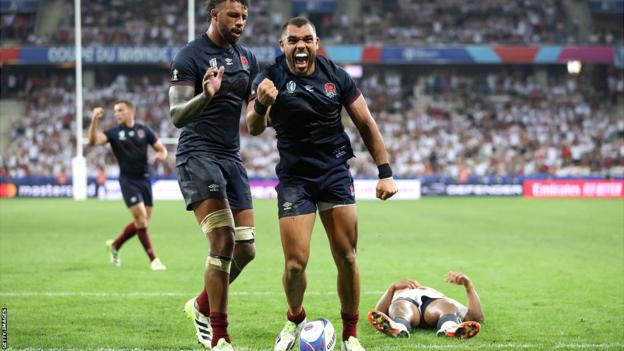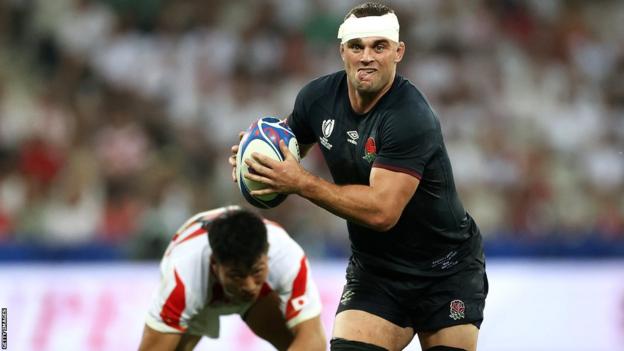Products You May Like

Never mind the challenges still in store for England in this tournament, think about how far they have come.
Arriving at this Rugby World Cup on the back of three underwhelming defeats in four warm-up Tests, they were under enormous pressure.
It will have been so hard for the players to keep beating the drum about how well it is going, how connected they are and how good the culture is, in the aftermath of those losses to Wales, Ireland and Fiji.
Jonny May pretty much admitted it on Friday. He said he had “dreaded” what a defeat by Argentina in England’s opening match would have done to the atmosphere in the camp.
He hasn’t had to find out.
England have two wins, nine points and their route out of Pool D and into the quarter-finals pretty much assured.
They are in a much better position than we thought, or feared, they might be at the start of this campaign. That is a huge positive.
And it isn’t just those headline results. When you dig into the detail of their performance against Japan, there are more reasons for optimism.

The way they played in that second half against Japan in Nice was the high point of Steve Borthwick’s nine months in charge of the team.
After a first half when they committed too many errors and seemed tied to a prescribed script of training ground moves and attacking kicks, they improved markedly after half-time.
Whether they were reacting to something Borthwick had said or Japan’s own looser style, they found another gear, with more tempo, intent and clarity about their play.
They won that second half 21-3, scoring three tries and looking like they were enjoying themselves having found a style that suited them.
Earl and Ludlam performances add to back-row options
Of course, there are caveats.
Japan tired quickly in the second half.
England will come up against opponents where metres are far harder to make, when their forward runners are knocked back over the gainline, rather than allowed to repeatedly plough across it.
Their mistakes in the first half will be the focus of the team’s debrief. Against top teams, they won’t be able to waste as many opportunities and still have more come their way. That lack of efficiency would cost them.
But I am really positive about what we saw and how the team has developed.
Ben Earl was a bit-part player for England earlier this year. A couple of appearances off the bench were his only involvements in the Six Nations. Borthwick sat him down and told him the areas he wanted to see improvement in and it seems like it has really worked.
Earl was everywhere against the Brave Blossoms. It was a game that really suited him, where he could make an impact at close quarters but also find space out wide where his pace and hands are a point of difference.
Lewis Ludlam’s work-rate was excellent alongside him in the back row and, with Tom Curry and Billy Vunipola not starting this match, there is real depth in that area.
I thought Alex Mitchell improved with the rest of the team and by the second half he was attacking fringes and darting blind to good effect.
George Ford had another good game bossing the backline and Marcus Smith was lively and dangerous in his 11 minutes as a replacement.
What Borthwick has to do now is balance maintaining that momentum with managing his squad.

Maintain momentum or invest in squad depth?
England’s next opponents are Chile, the lowest-ranked team in the tournament.
There is an argument that, having only really stumbled on a settled line-up through circumstances and these first two pool games, you run a similar line-up again and give combinations as much time as possible to click before the knockout stages.
I would do the opposite though.
Anyone who hasn’t yet played, I would bring into the starting line-up to face Chile on Saturday.
Where he puts Owen Farrell, suspended for the meetings with Argentina and Japan, is the big call.
But, for me, it is simple. Ford has tied down that fly-half role and Farrell’s only way into the first-choice starting line-up is in midfield. He should start against Chile at 12 and prove himself there.
Hooker Jack Walker, prop Bevan Rodd, second row David Ribbans, back row Jack Willis, and wings Henry Arundell and Max Malins are the others who are yet to get any minutes in this campaign and must next weekend.
It is crucial to have everyone invested and involved. That builds the squad unity that is so important in meeting rooms and training pitches on a long tournament campaign.
And the reality over seven weeks of Test rugby is that injuries will happen and the best-laid plans will be blown to pieces.
In the last Rugby World Cup final, England had Ben Spencer on the pitch. He had been flown out just days before because of injury to Willi Heinz.
You never know who you are going to have to depend on. And if you have invested in those fringe players in the pool stages, it can pay you back later in the campaign when the stakes are far higher.
Matt Dawson was speaking to BBC Sport’s Mike Henson
